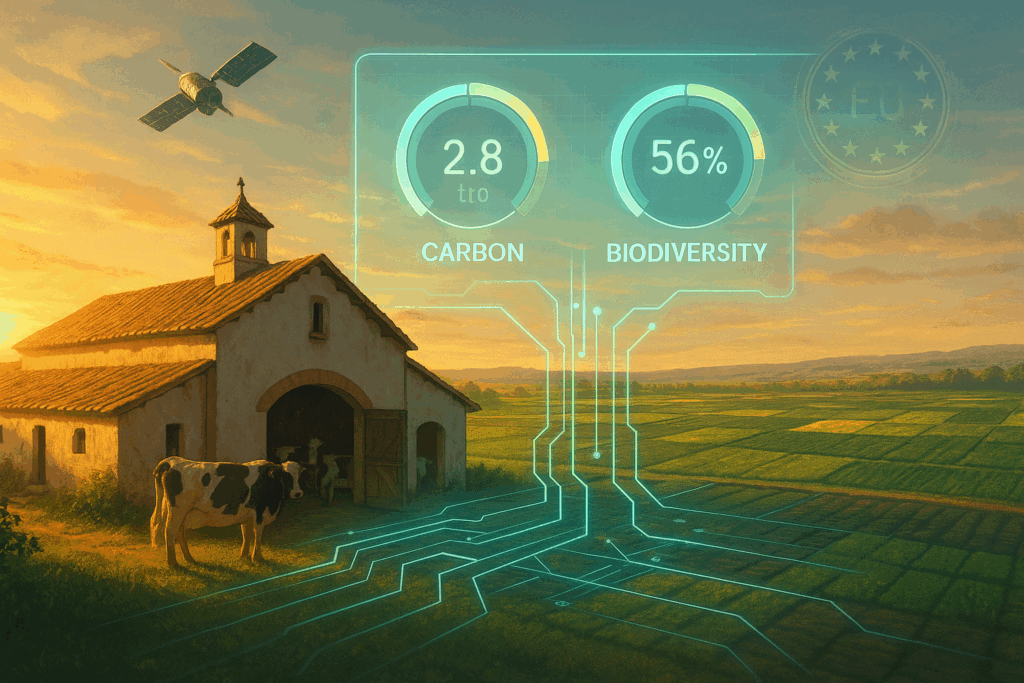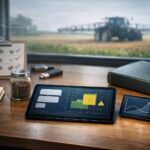A Spanish agtech startup called ODOS has secured seed funding to help one of Europe’s oldest industries – agriculture – meet some of today’s newest demands around climate compliance. ODOS (pronounced like “odos”) is developing digital tools for Monitoring, Reporting, and Verification (MRV) of farm-level emissions and biodiversity, tailored for the sprawling network of agricultural cooperatives across Europe. In the past few days, the company closed a €680,000 seed round led by Capsa Food / Central Lechera Asturiana, with TTAF by Clave and Angels (Juan Roig’s fund) joining in, positioning it to scale up its platform just as environmental regulations put unprecedented pressure on farming communities to prove and improve their sustainability.
Table of Contents
ToggleClimate Rules Tighten for Agriculture
Agriculture sits in the crosshairs of Europe’s climate strategy. The sector accounts for roughly 10% of EU greenhouse gas emissions (mostly methane and nitrous oxide from livestock and soil management), and it has significant impacts on biodiversity through land use. Until recently, farms were largely exempt from direct emissions disclosure requirements. That’s changing fast. The EU’s new Corporate Sustainability Reporting Directive (CSRD) will compel nearly 50,000 companies – including large food processors, retailers, and cooperatives – to report detailed climate and environmental impacts. Moreover, the EU has approved a law to curb imports linked to deforestation and is pushing “Farm to Fork” strategies that demand sustainable practices down to the farm level. In short, the entire agri-food value chain in Europe is facing a compliance overhaul: companies must quantify on-farm emissions, set reduction targets, and verify progress or risk penalties and loss of market access.
For Europe’s thousands of farm cooperatives – member-owned collectives that handle processing and marketing for farmers – this poses a massive challenge. Many co-ops will effectively need to aggregate and report the carbon footprint of hundreds of small farms, track improvements from green practices, and ensure data integrity for audits. Historically, co-ops have excelled at pooling milk or grain, but not carbon metrics. Data on fertilizer usage, manure management, or field biodiversity often lives in paper logbooks or disparate spreadsheets. Even when data is collected (e.g. via sustainability initiatives), the lack of common methodology and real-time tracking makes credible reporting difficult.
This is the gap ODOS aims to fill. Founded in 2022 by environmental engineers and agronomists, the startup’s mission is to help agri-food businesses turn sustainability from a burden into a manageable (even monetizable) asset. The timing is fortuitous: regulators’ sticks (compliance mandates) and carrots (EU green grants) are creating both pain and opportunity. Investors in ODOS’s seed round are betting that as climate accountability in farming becomes compulsory, demand will soar for tools that simplify MRV at scale. Rather than each cooperative developing its own system, ODOS offers a specialized platform that any co-op can onboard to meet the new standards efficiently.

From Farm Data to Climate Compliance
ODOS’s product is a cloud-based platform that measures and monitors emissions and biodiversity across agricultural value chains. At its core is an engine for Life Cycle Assessment (LCA) tailored to farm operations. This engine crunches data on everything from a dairy farm’s feed and manure management to a vineyard’s fertilizer use and energy consumption, calculating the carbon footprint (CO₂ equivalent) per unit of product. The platform is designed to ingest data at the farm level – via web or mobile apps used by farmers or field officers – and roll it up to cooperative level to give an aggregate picture.
Crucially, ODOS focuses on automation and accuracy in data collection. It integrates with on-farm sensors and existing farm management software where available, and in other cases provides user-friendly interfaces for manual input. The company has even developed machine-learning models to estimate certain metrics where direct data is sparse – for instance, using satellite data to gauge crop yields or pasture health as proxies for carbon sequestration. One standout feature is its Biodiversity Assessment tool, which uses satellite imagery and ML to map habitat areas on and around farms and evaluate their quality. This helps cooperatives track changes in ecosystem indicators, not just emissions, aligning with Europe’s increasing focus on biodiversity alongside carbon.
The platform includes dashboards and reporting templates aligned with emerging standards such as the GHG Protocol for agriculture (including Scope 3 “FLAG” – Forest, Land, and Agriculture emissions) and the EU’s CSRD requirements. In practice, an olive oil cooperative in Spain, for example, can use ODOS to measure the carbon footprint per liter of olive oil, including all member farms’ contributions, and generate reports for its buyers or regulators. The software can highlight hotspots (say, a subset of farms with unusually high fertilizer emissions) and model the impact of mitigation measures (like adopting cover crops or precision feeding). This turns compliance into a more dynamic process, where co-ops and farmers can see the effect of changes in near-real-time rather than wait for an annual audit.
Another innovative aspect is ODOS’s support for carbon insetting. Unlike carbon offsetting (which often involves buying credits from unrelated projects), insetting refers to investing in emission reductions within one’s own supply chain. ODOS’s platform is built to help companies identify and implement insetting projects – for instance, a dairy co-op subsidizing methane-reducing feed additives for its farmers – and then quantify those emission savings accurately. This resonates with many European brands that prefer to cut emissions in their own supply chain (to meet Scope 3 targets) rather than rely solely on purchasing offsets. ODOS provides the accounting backbone for such initiatives, ensuring that any claimed reductions are backed by robust data. As the company’s site notes, its models provide “verified carbon and biodiversity insetting opportunities” for partners like supermarkets and food brands that want to invest in sustainability upstream.
Empowering Europe’s Farm Cooperatives
ODOS has deliberately targeted cooperatives as a beachhead customer segment. Agricultural co-ops are prevalent across Europe – from dairy giants in Spain and Ireland, to wine cooperatives in France, to olive oil collectives in Italy – often encompassing hundreds or thousands of farmers each. By landing a contract at the co-op level, ODOS can effectively onboard a whole network of farms in one go. It’s a classic B2B2C strategy: serve the aggregator (co-op), who then brings along the end-users (individual farmers). This strategy is already bearing fruit. Despite being an early-stage company, ODOS has signed on over 30 clients in Europe to date, including some marquee names:
- CAPSA (Central Lechera Asturiana) – one of Spain’s largest dairy cooperatives, and an early adopter of ODOS. CAPSA’s sustainability director notes that “ODOS is contributing significantly to our sustainability strategy… helping optimize data collection [and] monitor various impacts on livestock”, which is vital for meeting their environmental goals. By using ODOS, CAPSA can track the carbon footprint of its milk from farm to dairy plant and identify efficiency gains (like improved feed conversion or manure management) that cut emissions.
- Carbery – an Irish dairy and ingredients cooperative – utilized ODOS for the Farm Zero C pilot project aimed at carbon-neutral farming. Carbery’s sustainability director praised ODOS’s expertise in delivering LCA results for cheese and dairy products swiftly. The ability to handle complex products (like cheese, which has multi-stage processing) showed the platform’s robustness.
- Monaghan Mushrooms (Ireland) – used ODOS to review their existing LCA and got insights into “material carbon loading” in their supply chain. This demonstrates how ODOS can help even companies outside mainstream agriculture (like horticulture) refine their footprint analysis.
- Connolly’s Red Mills – an Irish animal feed producer – engaged ODOS for carbon footprinting of feeds. The client lauded ODOS’s tool as “high-quality [and] user-friendly”, indicating that even non-experts found the interface accessible. This ease of use is critical when the end-users include busy farmers and mill operators.
By winning such reference clients, ODOS builds credibility in the tight-knit agri-food community. Cooperatives talk to each other through industry federations and EU sustainability forums, so a success in one subsector (dairy) can lead to interest in another (grains or meat). The seed funding will allow ODOS to ramp up its customer success and onboarding teams to handle this growing demand. The company plans to invest in localized support – for example, having field consultants who can train farmers on the app in their native language and help interpret the data insights. It’s a necessary step because while the software is central, sustainability transformation also requires human support to change practices on the ground. ODOS appears to recognize this, positioning itself not just as a software vendor but a partner in strategy development; they assist clients in “develop[ing], monitor[ing] and implement[ing] Net Zero and Nature Positive strategies” tailored to their situation.
Seeding Sustainability (and New Revenue) on the Farm
For cooperatives and their member farms, complying with climate mandates is often seen as a cost center – something that must be done to avoid penalties or please stakeholders, but not generating income. ODOS is trying to change that narrative by highlighting how sustainability data and improvements can unlock financial opportunities. One obvious angle is access to premium markets and finance: food manufacturers and retailers increasingly favor suppliers who can prove low-carbon, deforestation-free products. Co-ops using ODOS can provide that proof, potentially securing better contracts or prices. Likewise, green finance (like sustainability-linked loans from banks or EU grants) often require metrics and verification; ODOS-equipped co-ops are better positioned to tap those funds.
Another avenue is the voluntary carbon market – though it has its pitfalls (as seen in controversies over offset credibility). Rather than selling offsets externally, co-ops might use verified emissions cuts as insetting credits to sell to their downstream buyers. For example, a supermarket chain might pay a dairy co-op to reduce emissions within their milk supply, instead of buying random offsets. ODOS can facilitate this by accurately measuring the reduction achieved when, say, farmers install biogas digesters. While still early, these models could create new revenue streams for farmers who adopt regenerative practices, effectively rewarding them for ecosystem services.
ODOS’s bet is that over time, sustainability will become as integral to farm economics as yield and quality. Just as co-ops historically helped farmers improve productivity and marketing, now they will help them improve carbon and biodiversity performance – and monetize it. The software provides the backbone to manage this complex new dimension. Of course, challenges abound: data collection from small farms can be laborious, and not every farmer is tech-savvy or convinced about climate measures. ODOS will need to ensure its tools are simple, localized, and provide value back to the farmer (for instance, by highlighting efficiency improvements that save cost, or by giving farm-level benchmark reports so farmers can see how they stack up against peers).
The competitive landscape in climate-tech for agriculture is heating up too. Other startups offer farm carbon calculators or satellite monitoring of fields, and big consulting firms are eyeing the space of sustainability reporting for agri-business. ODOS distinguishes itself by focusing on cooperatives and providing an integrated suite (carbon + biodiversity + reporting compliance in one). As EU regulations tighten over the next 2–3 years, there may well be more work than any one player can handle, which bodes well for a first-mover like ODOS to grab significant market share.
In summary, ODOS’s recent seed funding – though small in dollar terms compared to some tech raises – could have an outsized impact by enabling Europe’s farming sector to leap forward in climate accountability. By turning sustainability metrics into actionable intelligence and forging a link between the farm and the boardroom (or supermarket) when it comes to environmental impact, ODOS embodies the kind of data-driven approach needed to green one of humanity’s oldest endeavors. As nearly 50,000 EU companies gear up to disclose their climate and environmental footprints under new rules, tools like ODOS will be indispensable. The coming years will show if this young startup can help transform European agriculture from a climate problem into a climate solution – and perhaps inspire similar models worldwide.




